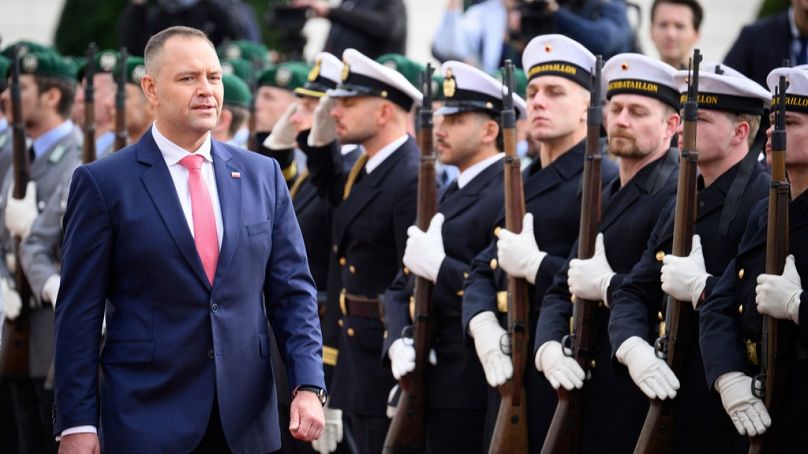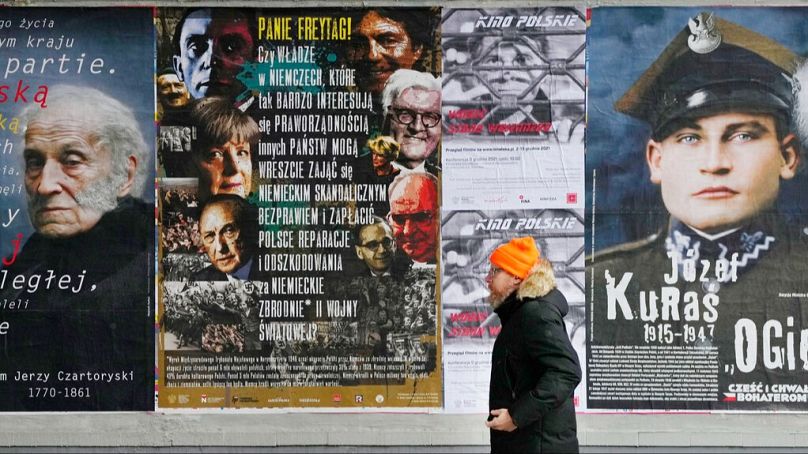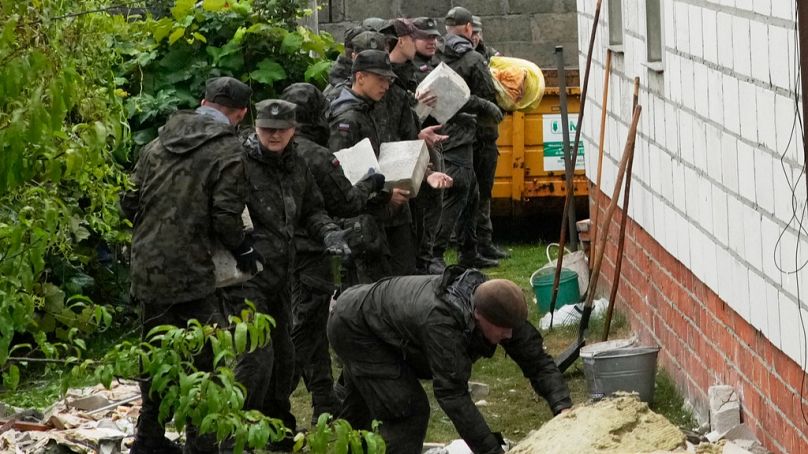Polish President Karol Nawrocki has arrived in Berlin with a clear demand: war reparations from Germany. Yet amid Russian aggression, Poland also needs its neighbour’s support. Experts told Euronews what's at stake.
Poland's President Karol Nawrocki made his inaugural visit to Germany on Tuesday, amid growing concerns over Russian aggression and renewed Polish demands for reparations for Nazi crimes committed during World War II.
Nawrocki was received with military honours at Bellevue Palace - the official residence of German President Frank-Walter Steinmeier - before a one-on-one meeting with Germany's Chancellor Friedrich Merz.
The topic of reparations is likely to be one of the main talking points. Earlier this month Nawrocki repeated his call for war reparations from Germany, and said the future of the relationship between the two neighbours could hinge on resolving the issue.
Poland needs Germany - now more than at any time in recent history. Just last week, Russian drones violated Polish airspace. But will the push for reparations strain German-Polish ties?
"What we certainly don’t need right now is a weakening of German-Polish relations through a reparations debate, especially since Germany considers the matter closed," Knut Abraham (CDU), the German government's commissioner for Polish affairs, said in an interview with Euronews.
"The occupation cannot be compensated with money," said Abraham, adding that he did not expect any meaningful negotiations on the issue during Nawrocki’s state visit.
"We need to look at how we can work together to overcome the darkness of our shared history."
Poland divided over World War II past
From the perspective of the German government, there is no legal obligation under international law to provide reparations to Poland.
In 1953, Poland's then-communist leaders waived all claims to future war reparations under pressure from the Soviet Union.
Poland remains divided: some want to move forward and leave the past behind, while others - citing the massive destruction and losses during World War II - continue to demand reparations from Germany, sometimes with overtly anti-German rhetoric.
"It is always a threat to global peace when individual nations or ethnic groups are turned into scapegoats," said Peter Oliver Loew, a professor at the Technical University of Darmstadt who also serves as the director of the German-Polish Institute.
The issue of reparations, he stressed, is primarily a political one. "It is used as a tool to repeatedly put Germany on the defensive and try to extract concessions."
"This sceptical or anti-German discourse has historical roots in the brutalities and atrocities Germany committed in Poland during the war - events still largely unknown in much of the German public," Loew added.
"But we must move beyond history and continually seek pragmatic paths to cooperation."
In 2022, Poland's then-ruling Law and Justice or PiS party estimated its WWII losses caused by Germany to stand at 6.2 trillion zlotys (worth about €1.3 trillion at the time).
Calls for German-Polish cooperation on security
CDU's Abraham has proposed a "modern translation of the concept of reparations".
But what might that look like in practice? He envisions a security policy partnership encompassing "personnel, military, and financial" commitments.
One concrete example is a joint German-Polish initiative to protect critical infrastructure in the Baltic Sea.
"We've seen how vulnerable the infrastructure there is: power cables, communication lines, gas pipelines. This is a project where we can achieve something together," said Abraham.
Germany could also help Poland to defend its airspace. Last Wednesday, 19 Russian drones entered Polish airspace. Abraham described the incursion as "completely unacceptable".
Loew believes that German-Polish cooperation on security has room for improvement.
"The security and military cultures of Germany and Poland need to be more closely interconnected," he said. "Poland primarily looks to the United States for security, while Germany thinks more in terms of NATO and European partners."
Yet better cooperation is essential, Loew emphasised.
"Through joint weapons procurement, through Polish participation in a joint missile or drone defence system, through shared investments," he added. "Nothing strengthens ties more than doing something together, even in the field of defence."
While ties between Poland and Germany have been rocky in recent years, Russia's full-scale invasion of Ukraine in early 2022 and aggression in the region are drawing the neighbours closer together in some respects, according to Abraham and Loew.
"We are part of a community of shared destiny," Abraham said. "External threats bring us closer internally."
Loew agreed, saying: "This should bring both countries together. After all, Poland directly borders Russia in the Kaliningrad region. That area is heavily militarized with medium-range missiles, aircraft, tanks, and troops."
Germany should join forces with Poland to ensure Europe's security and prepare for further Russian aggression, according to Loew.
He also said that Germany must be willing to listen to Poland, which has been "observing Russia closely for decades".
Reparations demands unlikely to fade
In addition to security matters, Abraham said he saw potential for better economic cooperation between Germany and Poland.
Poland is Germany’s fourth-largest trading partner.
"Germany exports more to Poland than to China," Abraham added. "It’s a win-win situation, and we should build on it - without forgetting what happened."
Despite the calls for closer cooperation on security and trade, there is little prospect of Poland dropping its demands for reparations from Germany. How might Berlin respond?
Loew offered a sober assessment: "It's unlikely that Poland will simply drop its reparations claims. Doing so would provoke outrage, especially on the right-wing side of Polish politics," he said. "We need a series of reciprocal steps, both in terms of security and symbolically."
"We must acknowledge the suffering Poland endured during World War II at Germany’s hands," he added.
Loew proposed building a permanent Polish memorial in Berlin, as well as a cultural centre to bring Poles and Germans together and educate people about the shared history.
Providing compensation to the last surviving Polish victims of World War II is also conceivable, said Loew. "Ultimately, it's good that we're talking about the unfinished aspects of our shared history."
What might be the next step?
"A policy of mutual respect, a genuine acknowledgment of the Polish government and the Polish president," Loew concluded. Frequent consultations and coordination between the two countries are also key to finally moving past the "reparations trap," he said.














